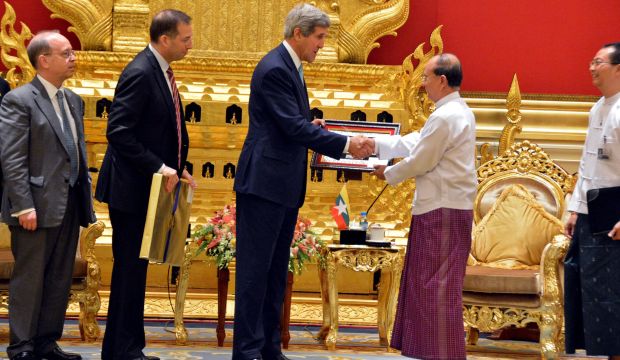
Myanmar president Thein Sein shakes hands with US Secretary of State John Kerry after their meeting at the President Office in Naypyitaw, Myanmar, on August 9, 2014. (EPA/MNA)
Naypyitaw, AP—US Secretary of State John Kerry is in Myanmar seeking to calm tensions in the South China Sea between China and its smaller neighbors.
Amid concerns about recent provocative steps taken by China and others regarding several disputed territories in the sea, Kerry opened talks with senior Southeast Asian officials at a regional security forum here at which the conflicting claims are expected to be high on the agenda.
Kerry began by meeting Vietnamese Foreign Minister Pham Binh Minh, whose country has been involved in numerous maritime spats with China, including most recently being angered by the deployment of a deep-sea oil rig in early May near the Paracel islands, which are claimed by both Hanoi and Beijing.
Although the Chinese removed the rig two months later, the incident continues to rankle Vietnam.
Washington is concerned that while China’s withdrawal of the rig in mid-July had removed an irritant, it had left a legacy of anger and strained relations with Vietnam and likely raised serious questions among China’s other neighbors about its long-term strategy.
US officials say Kerry will be urging the Chinese and other claimants to take voluntary steps to ease the mounting discord, while they continue to work on a binding code of conduct for activity around disputed areas. The US and others fear that an escalation in tension could hamper international shipping and lead to conflict. Washington has said for years that maintaining calm in the South China Sea is a US national security interest to the annoyance of China.
The US is calling for a freeze in actions that change the status quo, such as seizing unoccupied islands and land reclamation.
Washington says it is neutral in the disputes, and one US official said Kerry “is not looking for a showdown” with the Chinese, arguing that the issue “is not a superpower battle.” The official was not authorized to be identified discussing the issue.
Yet Beijing has reacted negatively to any American involvement in the past, and in fact Chinese officials have already made clear they don’t support the proposal.
China says it has a historical right to most of the South China Sea and resents what it sees as US meddling, viewing it as an attempt to contain its growing power.
Still, the US is determined to press its point.”China as a large and powerful nation has a special responsibility to show restraint,” the top US diplomat for East Asia, Danny Russel said earlier this week. “There is a big footprint that comes with military strength and it warrants setting your foot very, very carefully and treading very gingerly when you are in a sensitive area.”
The other South China Sea claimants include the Philippines, which is a US treaty ally, Taiwan, Malaysia and Brunei. The US wants all of them, including Vietnam, to do more to clarify what they say is theirs in accordance with international law and the quick completion of the long-delayed code of conduct—another initiative China is unenthusiastic about.
Outside the South China Sea, China has maritime disputes with other neighbors and Japan last week angered the Chinese by assigning names to five small islands that are part of a cluster that both nations claim. The US would like to see the voluntary freeze on provocative actions extended to those disputed areas as well.
Separately, while in the Myanmar, Kerry will be pressing the country’s leaders to apply greater safeguards for human rights. Kerry will also be gauging the former pariah nation’s preparations for 2015 elections. Kerry will raise the issues in separate meetings with Myanmar’s President Thein Sein later Saturday and then again with opposition leader and Nobel peace laureate Aung San Suu Kyi on Sunday.
Last week, more than 70 US lawmakers warned of worsening conditions in Myanmar, also known as Burma, including anti-Muslim discrimination and violence, and urged the Obama administration to sanction those complicit in abuses and atrocities. The lawmakers also urged Obama not to make further concessions to the reformist government unless there’s significant progress.
Secular violence is perhaps worst in Rakhine state, where Buddhist mobs are accused of attacking Rohingya Muslims, a phenomenon that has spread to other parts of the country, sparking fears that nascent democratic reforms in the predominantly Buddhist nation of 60 million people, which emerged from a half-century of military rule with an election in 2010, could be undermined by growing religious intolerance.
In addition, US officials have accused Myanmar authorities of backsliding on pledges of democratic transition, including the recent sentencing of five journalists to 10 years at hard labor for a disputed story about a weapons factory.
After Myanmar, Kerry will travel to Australia to join US Secretary of Defense Chuck Hagel and Australian officials for security talks.
